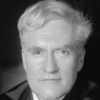Benjamin Cardozo

Benjamin Cardozo
Benjamin Nathan Cardozowas an American jurist who served on the New York Court of Appeals and later as an Associate Justice of the Supreme Court. Cardozo is remembered for his significant influence on the development of American common law in the 20th century, in addition to his philosophy and vivid prose style. Cardozo served on the Supreme Court six years, from 1932 until his death in 1938. Many of his landmark decisions were delivered during his eighteen-year tenure on the...
NationalityAmerican
ProfessionSupreme Court Justice
Date of Birth24 May 1870
CountryUnited States of America
The constant assumption runs throughout the law that the natural and spontaneous evolutions of habit fix the limits of right and wrong.
History or custom or social utility or some compelling sense of justice or sometimes perhaps a semi-intuitive apprehension of the pervading spirit of our law must come to the rescue of the anxious judge and tell him where to go.
I take judge-made law as one of the existing realities of life.
More truly characteristic of dissent is a dignity, an elevation, of mood and thought and phrase. Deep conviction and warm feeling are saying their last say with knowledge that the cause is lost. The voice of the majority may be that of force triumphant, content with the plaudits of the hour, and recking little of the morrow. The dissenter speaks to the future, and his voice is pitched to a key that will carry through the years.
Law never is, but is always about to be.
The final cause of law is the welfare of society.
Due process is a growth too sturdy to succumb to the infection of the least ingredient of error.
Membership in the bar is a privilege burdened with conditions.
The prophet and the martyr do not see the hooting throng. Their eyes are fixed on the eternities.
With traps and obstacles and hazards confronting us on every hand, only blindness or indifference will fail to turn in all humility, for guidance or for warning, to the study of examples.
The repetition of a catchword can hold analysis in fetters for fifty years or more.
It is for ordinary minds, not for psychoanalysts, that our rules of evidence are framed. They have their source very often in considerations of administrative convenience, or practical expediency, and not in rules of logic.
Expediency may tip the scales when arguments are nicely balanced.
Inaction without more is not tantamount to choice.